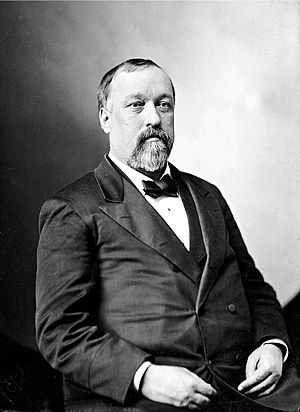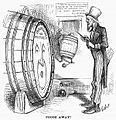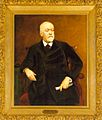Benjamin Bristow facts for kids
Quick facts for kids
Benjamin Bristow
|
|
|---|---|
 |
|
| 30th United States Secretary of the Treasury | |
| In office June 4, 1874 – June 20, 1876 |
|
| President | Ulysses S. Grant |
| Preceded by | William Richardson |
| Succeeded by | Lot M. Morrill |
| 1st Solicitor General of the United States | |
| In office October 1, 1870 – November 12, 1872 |
|
| President | Ulysses S. Grant |
| Preceded by | Position established |
| Succeeded by | Samuel F. Phillips |
| Personal details | |
| Born |
Benjamin Helm Bristow
June 20, 1832 Elkton, Kentucky, U.S. |
| Died | June 22, 1896 (aged 64) New York City, U.S. |
| Political party | Whig (Before 1860) Republican (1860–1896) |
| Education | Washington and Jefferson College (BA) |
| Military service | |
| Allegiance | |
| Branch/service | |
| Years of service | 1861–1863 |
| Rank | |
| Battles/wars | American Civil War • Battle of Shiloh |
Benjamin Helm Bristow (June 20, 1832 – June 22, 1896) was an American lawyer and politician. He is best known for being the 30th U.S. Treasury Secretary and the very first Solicitor General.
As a Union officer during the Civil War, Bristow was a Republican Party member who believed in making government better and protecting civil rights. While he was Treasury Secretary, he famously stopped a big tax evasion scheme called the Whiskey Ring. President Grant asked him to do this. Bristow also believed in using gold standard money instead of paper money.
As the first Solicitor General, Bristow helped President Grant and Attorney General Amos T. Akerman take strong action against the Ku Klux Klan in the South after the Civil War. He also supported African American citizens in Kentucky getting the right to speak in court. Bristow believed that public money should pay for education for everyone, no matter their race.
Bristow was born in Kentucky. His father was a well-known lawyer and politician. After graduating from college in 1851, Bristow became a lawyer. When the American Civil War started in 1861, he joined the Union Army and became a colonel. He was hurt at the Battle of Shiloh. After the war, he became a U.S. District Attorney.
In 1870, Bristow became the first U.S. Solicitor General. This job meant he helped the U.S. Attorney General by arguing cases in the U.S. Supreme Court. In 1874, President Grant made him the U.S. Secretary of the Treasury. Bristow was very popular for going after the Whiskey Ring. However, when his investigation showed that Orville Babcock, President Grant's personal secretary, might be involved, Bristow's relationship with Grant became difficult. In June 1876, Bristow left Grant's team. He then tried to run for president but was not chosen by the Republican Party. After that, he returned to being a lawyer in New York City until he passed away in 1896.
Historians often say Bristow was one of President Grant's best choices for his team. People who wanted to fix government problems were happy with how Bristow handled the Whiskey Ring. He is also praised for his work against the Ku Klux Klan as the first Solicitor General.
Contents
Benjamin Bristow's Story
Early Life and Education
Benjamin Helm Bristow was born on June 20, 1832, in Edwards Hall in Elkton, Kentucky, United States. His father, Francis M. Bristow, was a well-known lawyer and politician. Benjamin graduated from Jefferson College in Pennsylvania in 1851. He then studied law with his father and became a lawyer in Kentucky in 1853. His father was strongly against slavery and supported the Union, which greatly shaped Bristow's own beliefs.
Marriage and Family
On November 21, 1854, Bristow married Abbie S. Briscoe. They had two children: a son named William A. Bristow and a daughter named Nannie Bristow. William later became a lawyer and worked in his father's law firm in New York. Nannie married Eben S. Sumner, a businessman and politician from Massachusetts.
Soldier in the Civil War
In 1858, Bristow and his wife moved to Hopkinsville, Kentucky, where he worked as a lawyer. When the American Civil War began in 1861, Bristow strongly supported the Union. He joined the Union Army and helped gather soldiers for the 25th Kentucky Infantry.
Bristow fought under General Ulysses S. Grant in important battles like Fort Henry, Fort Donelson, and Shiloh. At the Battle of Shiloh in April 1862, Bristow was seriously injured by an exploding shell. He was temporarily unable to fight and needed time to recover. After he got better, he returned to service and helped recruit soldiers for the 8th Kentucky Cavalry. He was promoted to lieutenant colonel and then to colonel. In July 1863, Colonel Bristow and his cavalry helped capture John Hunt Morgan during his famous raid.
Starting His Law Career
On September 23, 1863, Bristow left the Union Army. He had been elected as a Kentucky State Senator without even knowing it! He served one term until 1865. As a senator, he supported all efforts to win the war, Abraham Lincoln's election in 1864, and the Thirteenth Amendment, which ended slavery.
In 1865, Bristow became an assistant to the United States Attorney. In 1866, he was made the district attorney for Louisville, Kentucky. He was known for strongly enforcing the 1866 U.S. Civil Rights Act. He worked as district attorney until 1870.
Fighting for Justice as Solicitor General
In 1870, the U.S. Department of Justice was created. On October 4, 1870, President Ulysses S. Grant appointed Bristow as the very first U.S. Solicitor General. He held this job until November 12, 1872.
Taking on the Ku Klux Klan
As Solicitor General, Bristow worked with U.S. Attorney General Amos Akerman to take legal action against thousands of Klansmen. Their efforts led to a short period of peace during the difficult Reconstruction Era in the South.
Speaking Up for Civil Rights
In 1871, Bristow gave a speech in his home state of Kentucky where he spoke up for African American civil rights. He argued that Black citizens should be allowed to speak in court cases. At that time, Kentucky law stopped 225,000 Black U.S. citizens from testifying in any case involving a white person. Bristow called this law a "monstrous and grievous wrong." He also said he would "tax the white man's property to educate the black man's child," showing his support for free education for everyone.
Cleaning Up as Treasury Secretary
On June 3, 1874, President Grant appointed Bristow as Secretary of the Treasury. This happened after the previous secretary left due to a scandal. The public saw Bristow as a much-needed reformer. He took charge of the Treasury during a tough economic time called the Long Depression, which started with the Panic of 1873. Bristow believed in using coin money (specie) to help stabilize the economy.
Making Changes in Government
Bristow immediately started making big changes in the Treasury Department. He got rid of a corrupt office and fired many people who were not doing their jobs well. He also made the department follow new rules to ensure people were hired based on skill, not connections. He fired over 700 people and brought in new rules to improve the department.
The Big Fight: The Whiskey Ring
In the spring of 1875, Bristow began a major effort to fight corruption. His most famous work was breaking up the Whiskey Ring, a powerful group based in St. Louis. This group was made up of whiskey makers and government tax agents who illegally avoided paying taxes on whiskey. This meant millions of dollars were missing from the national treasury. Previous attempts to stop the Whiskey Ring had failed because corrupt members in Washington D.C. would warn others.
Bristow received money from Congress to investigate the Whiskey Ring. He used undercover investigators to gather secret evidence. To keep the investigation a secret, Bristow used a special code for messages. His team found that the Whiskey Ring was shipping whiskey labeled as vinegar, listing it at lower strengths, or reusing tax stamps. This allowed them to avoid paying taxes.
Bristow's investigation showed that General John McDonald, a government official appointed by Grant, was a leader of the ring in St. Louis. On May 7, 1875, Bristow told President Grant about his findings. Grant immediately gave Bristow permission to go after everyone involved.
Three days later, on May 10, Bristow launched a huge operation. Treasury agents raided and shut down distilleries and other businesses in St. Louis, Chicago, Milwaukee, and other states. They seized books and papers that proved who was guilty. Over 350 people were accused of crimes. Bristow filed nearly 250 lawsuits and recovered over $3 million in unpaid taxes. He also got 110 people convicted.
Bristow's investigation even reached the White House. Evidence suggested that President Grant's private secretary, Orville E. Babcock, was involved with the Whiskey Ring. Bristow found two suspicious letters that seemed to be from Babcock. In October 1875, Bristow showed these letters to Grant's team. Babcock said the letters were about a bridge project, and Grant believed him. However, Babcock was still accused and went to trial in February 1876. President Grant even gave a statement defending Babcock, which was read to the jury. Babcock was found not guilty.
Resignation
After the Whiskey Ring investigations, especially Babcock's trial, Bristow's relationship with President Grant became difficult. Grant was upset that Bristow had pursued Babcock, whom Grant believed was innocent. There were also rumors that Bristow was using the Whiskey Ring investigation to try and become president himself. Because of these disagreements, Bristow resigned from his job in June 1876. He had always supported bringing back coin money and making government hiring fairer.
After His Government Service
Bristow was a strong candidate for the Republican presidential nomination in 1876. However, he was not chosen by the Republican Party; Rutherford B. Hayes received the nomination instead. Some members of the Republican Party felt Bristow had been disloyal to Grant during the Whiskey Ring prosecutions. Bristow, however, always said he wanted to protect President Grant and the country from scandal.
After the 1876 election, Bristow left politics. He never ran for office again. In 1878, he started a successful law firm in New York City. He became the second president of the American Bar Association in 1879. Bristow continued to support government reform and often argued cases in front of the U.S. Supreme Court until his death in 1896.
Death and Burial
In 1896, Benjamin Bristow became ill with appendicitis and passed away at his home on June 22, 1896. He was buried at Woodlawn Cemetery in the Bronx, New York.
What People Remember About Him
Historians mostly remember Bristow for successfully stopping the Whiskey Ring when he was Treasury Secretary. Even though he was a lawyer and not trained in finance, he was able to remove corruption from the tax department. Bristow showed great skill in taking down the Whiskey Ring, which had powerful political connections. His strong desire for reform was partly because he truly wanted to clean up the Republican Party, and partly because he hoped to become president. His actions upset some powerful politicians who supported the old ways, which led to him leaving his job.
As the first Solicitor General, Bristow helped take action against the Ku Klux Klan. This helped African Americans in the South vote freely without fear of violence. He was born in Kentucky, a Southern state, but spent his later years in New York.
Historian Jean Edward Smith said Bristow's appointment to Treasury Secretary was "one of Grant's best." Smith added that Bristow "brought a reforming zeal to the Grant administration."
Historian Ronald C. White said Bristow, as Secretary of Treasury, "brought honesty to the position."
Historian Ron Chernow called Bristow "honest and competent" and "A zealous advocate of civil service reform."
Images for kids
-
Bristow's birthplace, Edwards Hall
-
Benjamin Bristow
Secretary of Treasury
Bureau of Engraving and Printing -
Probe Away !
Thomas Nast
Harper's Weekly, March 1876
 | Jessica Watkins |
 | Robert Henry Lawrence Jr. |
 | Mae Jemison |
 | Sian Proctor |
 | Guion Bluford |









